Don't wanna be here? Send us removal request.
Text
Hi Anna,
Your post this week was lovely to read through. Thanks for sharing! Your belief that interpretation should be entertaining and enjoyable is a great one to have. I also agree that education is a crucial part of nature interpretation because without the knowledge of what is actually going on around us we are unable to fully appreciate it. Education also helps keep us safe when out in nature. Learning what berries and mushrooms are not safe to eat and what is the safest place to be in case of an extreme weather event are a few examples of this. It is our responsibility as interpreters to make sure our audiences stay safe when outdoors. I think it is great that you aim to understand the needs of different groups when interpreting. As we have been learning through the children’s podcast, and now the adult ones, different age groups have different levels of understanding and find different things interesting and engaging. By being prepared to cater to any group we make interpretation accessible to everyone. It is also great that you have given a lot of thought to your learning style and are aware that you need to feel something when interpreting. By provoking meaning and facilitating connections in nature you should be well equipped to interpret in the style that works best for you! Hopefully your passion for nature will be able to get your audiences excited about the world around them. I have a feeling you will be able to.
Thanks again for sharing!
Francesca :)
Blog post week 10
Throughout this blog I will be discussing and developing my overall ethics within nature interpretation. I will connect my points with different sources and discussions that we have touched upon throughout this course as they intersect appropriately. I will discuss the beliefs I bring to nature interpretation, the responsibilities I have within this field, the approaches that are most suitable for me as an individual and how I would translate all of this through interpretation in order to have a successful and rewarding career in this field.
The first major belief I bring into my interpretation is the power of education within interpretation. Interpretation should be an entertaining and enjoyable experience that people choose to participate in. Most people are looking for a leisurely experience when they are signing up for interpretation, however the way their experience becomes meaningful and allows them to form a deeper connection to the nature they were inherently curious about is because nature interpreters are educators. Education as a baseline for interpretation and the benefit of this is discussed within chapter 4 of the course textbook. Visiting a natural environment can be a great experience for people, but when the audience gets to dive deep into the history of a natural location and be educated on it, this creates space for a much deeper and more meaningful connection to the location and the experience which they will walk away with (Beck et al., 2018). This meaningful experience through education also makes the audience more inclined to care for the environment more than they did previously, provoking them to feel responsible for the protection of these areas and the natural environment.
Another belief I bring to interpretation is the interconnectedness of all life, humans, wildlife, and nature. In week 7, the article “The Music of Nature and the Nature of Music” resonated with these beliefs. This article gave a perfect representation of the interconnectedness of life. It represented music as universally experienced and enjoyed by describing the ways animals create music and humans create music, and the similarities between these processes (Gray et al., 2001). Plants and other environmental forces can also be included in this because of the sounds they make that resemble songs, like the rustling trees in the wind. I found this article beautiful, and viewed it as an example of the interconnectedness of life, the fact that humans, and animals of all forms, from all corners of the world are not as different as it might seem on the surface. The way that we all connect in our cultures, communication, pure amusement and connect emotionally to music shows how much more similar we are than different, and why it is so important to interpret and learn about the nature we share this earth with (Gray et al., 2001).

(Photo from: European Ranger Federation)
Now I will discuss the responsibilities I have and believe are part of my duty as an interpreter. The first responsibility I have is to understand the needs and learning levels of my target audience, specifically the age group of each audience. This is discussed throughout chapter 7 of the textbook titled “Serving Diverse Audience.” This chapter talks about the necessity of getting to know your audience as an interpreter, saying “to effectively serve and relate to audiences, you must know them (Beck et al., 2018).” Basing this on different audience age groups can provide a deeper connection between the audience and the interpreter, as well as the audience and the nature being interpreted. Doing research on how children learn, what their specific age groups have prior knowledge of in school and what keeps them engaged will elevate their interpretation experience exponentially. They will be more excited to participate and find passion in the information being taught, if the interpreter takes the time to make the information digestible, understandable and exciting. This can be said for teenagers, young adults versus older adults and elderly people. Tailoring an interpretation to your audience shows the care you have for the information you want to sharee, and your audience's experience.

(Photo from: European Ranger Federation)

(Photo from: Parenting Science)
The second responsibility I have is to respect the recreational benefits of interpretation. In chapter 3 of the textbook “Values to Individuals and Society,” the author discusses the importance of people's leisure time (Beck et al., 2018). This section mentions how people often do not want to spend their leisure time in a learning environment. This is why I feel it would be my responsibility as an interpreter to put the recreational and fun aspects of my interpretation as a priority. Making an interpretation educational, while still making it feel like a fun recreational experience is crucial because “pleasant experiences seem necessary to maintain a high quality of life (Beck et al., 2018).”
Another responsibility I feel is important and what I would bring to my interpretation would be to acknowledge my own experience and privilege as an educated white woman. I feel this is especially important when in a space where I would be interacting with people from all cultures, race, socioeconomic status and all different walks of life. An article that speaks to the importance of recognizing privilege is titled “Helping teachers unpack their invisible knapsacks” by Gallavan, 2005. Chapter 7 in the textbook that I mentioned previously also speaks to this when it discusses the importance of including and reaching diverse audiences from all backgrounds, as well as the importance of including people who are disabled. By unpacking my own privilege, I become a more self aware individual. This improves my ability to advocate for marginalized individuals and communities, which is essential when given a platform where people listen to your voice that reaches so many people with so much range in privilege.
Finally, I will discuss what approaches within interpretation would be most suitable to me as an individual. Chapter 6 of the course textbook outlines the different ways people learn and how they are all valuable in their own right. The 3 main learning types that are discussed within this section are cognitive domain learners, affective domain learners, and kinesthetic domain learners (Beck et al., 2018). Personally, I reside in the affective domain through what I prioritize in my learning and how I learn best, meaning this is the domain that would be the strongest within my interpretations. Effective learners prioritize the attitude and feeling that comes through learning (Beck et al., 2018). To learn is to provoke meaning and connection. I would bring this to my interpretations by putting strong emphasis on the feeling my interpretations bring to the audience, I want them to feel excited about what I am teaching them, to be engaged in the material and to feel like they are having fun and getting a meaningful experience out of their time rather than enduring a time of ingesting facts that they do not connect to and cannot understand. In order to optimize my interpreting career and make my work as accessible to as many people as possible, I would choose to do in person interpretations at specific nature sites that I am passionate about, talking about issues that I am passionate about as well. I would like to lead interpretive walks through these areas, giving the audience a chance to explore the area first hand, interacting physically while learning audibly. I would also like to make my interpretations available online, through a website, or even a youtube channel posting videos of my walks. This way, people who cannot afford to participate in interpretive experiences, or people who are not located near my in person interpretations can learn about the areas I interpret and can get as close to the in person experience as possible.
7 notes
·
View notes
Text
Hi Olivia,
I loved reading your post this week. It was very insightful. I enjoyed reading about the interpretive approach to communication, the TORE acronym, and feel that it is a great basis for interpretation. As a person who also loves to have systems and organized plans I believe following the TORE structure is a great way to plan out our interpretations. I think it is really cool that you would want to interpret through podcasts in the future, you must be loving our assignments! Podcasts are definitely a great way to reach a wider audience than would be possible face to face. Many people can tune into a podcast whether they are sitting down to listen to it or just have it on in the background. I think it is a great way of making nature accessible. It is also a good example of using technology to amplify nature’s reach. Nature tours are also a great idea! If you have a love for being out in the field, which it seems you do, then it would be a wonderful way of conveying your excitement for nature. I also love the picture you shared of Banff, I have never been but really want to go. It looks gorgeous!! I also wrote in my post that reviewing the learning styles would be crucial in order to be a good interpreter. I feel that if we fail to cater to each type then we are isolating a portion of the public and making nature less accessible to them.
Thanks again for sharing. I hope you have a great rest of the semester!
Francesca :)
Unit 10 Blog Post
This blog post was one of the most difficult blogs for me to write, not because I didn’t have any ideas, but because it was difficult to narrow down. In this blog, I will review the importance of interpretation for various age groups along with my personal ethic as a nature interpreter. I will go over what beliefs I bring, what responsibilities I have, and what approaches are most suitable for me as an individual. Additionally, I will bring in ideas from the textbook and readings throughout the course to shed light on why I have certain beliefs.
In the very first chapter of our textbook, we learned that interpretation translates or brings meaning to people about cultural and natural heritage (Beck et al., 2018). Additionally, interpretation translates or brings meaning to people about cultural and natural heritage (Beck et al., 2018). This chapter was significant to me because before this course, I knew very little about nature interpretation. The above evidence demonstrated to me what nature interpretation was, and even more so why it was so important. Interpretation doesn’t just tell people about nature; it connects them to it. This connection can benefit both people and nature. It aids nature in the sense that people care about it and want to protect it. It helps people in a variety of ways, bringing them joy and allowing them to develop a “sense of place” (Beck et al., 2018). A sense of place helps individuals recognize a location as more than a mountain, river, arboretum, or pioneer settlement. It identifies the special characteristics and the big story the place represents (Beck et al., 2018).

My best friend and I’s trip to Banff in 2022.
Chapter 5 in our textbook evaluated the concept of “thematic interpretation.” An approach that I thought was particularly interesting was the cornerstones of the interpretive approach to communication. It describes TORE: Thematic with a focus on the main message conveyed, Organized to provide structure and meaning, Relavent to the audience, and Enjoyable to the audience (Beck et al., 2018). I am the type of person who loves systems and organizing, so I would definitely use this as a framework within my interpretation. I think that this framework could be applied to anything but would be exceedingly beneficial to keep in mind during nature tours and podcasts.
I think for me, podcasts and nature tours would be my main approaches in regard to nature interpretation. I think this would help me reach a variety of people and deeply connect with them but also provide accurate information. I think that these approaches would also work well with my lifestyle. I really enjoy podcasts and think they are a great way to get information, because you can listen to them almost anywhere (i.e., in the car), and they do not have to be excessively long. Nature tours would also fit into my lifestyle nicely, especially since I love activities like hiking, walking and exploring nature.

Another Banff post, because it was too gorgeous not to share twice.
I think an important point I would want to review before taking on the role of an interpreter is learning styles. The textbook outlines that the more we can employ the use of all senses, the more likely we will enhance learning (Beck et al., 2018). Different people have different learning styles. Some people learn better by listening, some learn better by watching, and some by using hands on learning. In my interpretation, it would be important to me to apply these various samples. For example, on nature walks, I could allow people to experience the nature for themselves. I could especially do this by adding the element of discovery into my nature tours. I could also make some of my podcasts into vlogs, so people could be visually stimulated while listening as well.
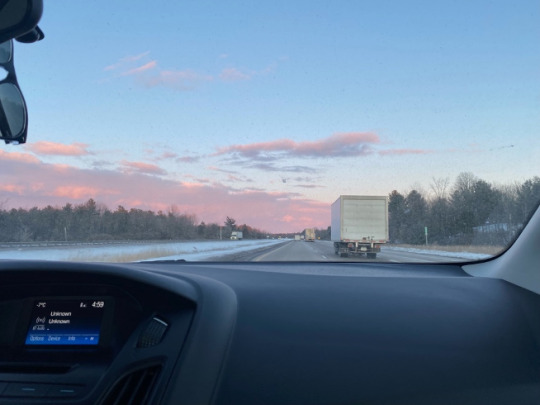
A pretty picture I took while sitting in the passenger seat in my hometown.
Another important idea of interpretation is knowing your audience. The textbook explains that interpretation and presentation programs should identify and assess their audiences demographically and culturally. Every effort should be made to communicate the site’s values and significance to its varied audiences (Beck et al., 2018). It also outlines that to know your audience you must know if they are local, young, or old, their demographics, their motives for attending, their attitudes and values (Beck et al., 2018). This is very important because not only does your presentation shift due to who you are presenting to, but it is also important to know demographics to understand economic, cultural, communication barriers and more. For instance, it might be difficult for elderly populations to do nature hikes. Flatter ground and shorter walks may be more beneficial for this age group.
Music is something that really touches my heart and I think it is beneficial to bring into interpretation. If my format of desire is a podcast, I could include music. The textbook states that music touches the emotions (Beck et al., 2018). When you touch people’s emotions, they develop a deeper sense of care for a place. Not only that, but people can also communicate important messages about nature through song. Music can spark emotion that results in people wanting change for issues such as global warming in nature. A belief I would bring into my interpretation would be the importance of music.

Skiing over winter break!
To summarize, as an interpreter, I believe that it is important to share information in a way that various age groups can digest, connect with, and remember. I want to create a “sense of place” for my audience. I think it is my responsibility to understand different learning styles and demographics of my audience. This will help me communicate with them clearly and effectively. Utilizing tactics like TORE, and methods such as podcasts and nature tours I would be able to be an interpreter with methods that are suitable for me as an individual. I believe that music is important to include in nature interpretation and will spark action in my audience’s hearts and minds.
5 notes
·
View notes
Text
Unit 10 Blog Post
Describe your personal ethic as you develop as a nature interpreter. What beliefs do you bring? What responsibilities do you have? What approaches are most suitable for you as an individual?
Throughout my life, and now throughout this course, my love for nature has grown and evolved quite a bit leading to the interpreter I am today. I feel that each week through the assigned textbook and supplemental readings, along with the blog prompts and getting to read others’ posts, I have been able to learn a lot about my personal ethic as an interpreter.
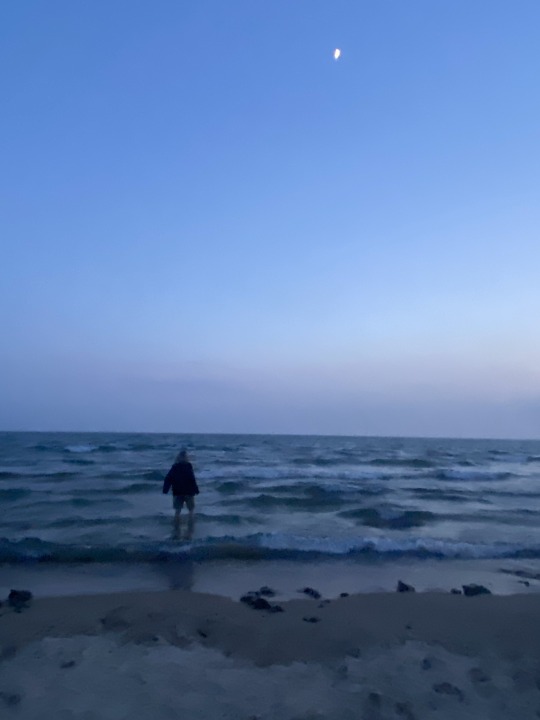
Me out in Lake Erie enjoying nature!
For me, I believe that the interpretation of nature through a variety of goggles is the best way to go about it. In fact, I believe that you cannot only interpret nature under one lens, you need a mixture of outlooks to truly understand and appreciate the natural world. As a science major, it is easy for me to believe that science is one of the most crucial ways we can interpret nature because it brings along an understanding of what exactly we are seeing around us. Understanding why plants are green or why chipmunks may be burying their food helps to provide a deeper understanding and appreciation of our environment. As mentioned in one of week five’s supplemental readings, complicated issues such as the loss of biodiversity gain a lot of support when community members are taught about, and engaged in, the science behind it (Wals et al., 2014). By interpreting nature through a scientific lens we are better able to make sure people are informed about what is really going on around them and hopefully inspire them to take action when the natural world around them is at risk.
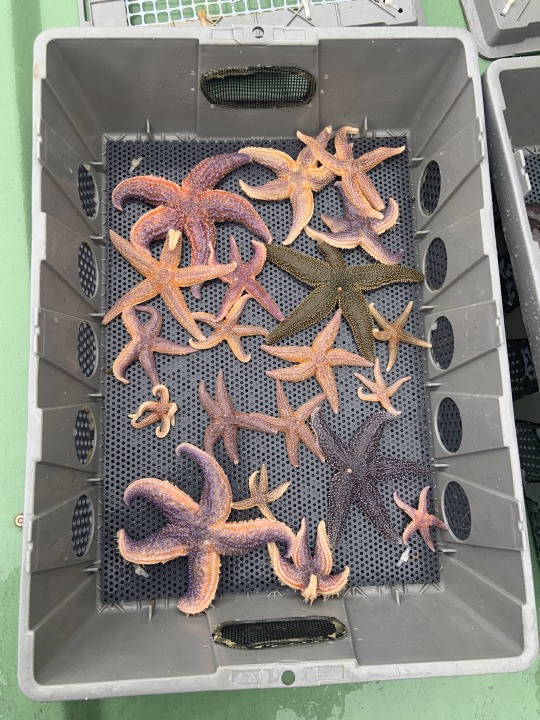
Sea stars I collected for experiments in a marine research course!
Even though I believe that science is necessary when interpreting nature, I do not think it would provide someone with everything they needed to love nature for all that it is. While science provides an understanding of what is going on, it sometimes lacks emotion. I believe that a major part of nature is the emotions that it provides to the interpreter and one of the main ways to feel those emotions is through forging a more personal connection through the arts. Whether that be through painting, drawing, crafts, music, or any other form of art, it is what truly connects us to nature. Taking something as simple as a lone tree in a field and interpreting it in a way that is personal to you, making something physical out of what you are seeing, is the most pure form of interpretation in my mind. Boeckel et al (2015)., mention that there is a disenchantment of the world occurring along with a loss of direct nature experiences. I feel that by taking what we see in nature and making something out of it we are effectively reconnecting with it because we have to take the time to be immersed in it to generate ideas on what to make.
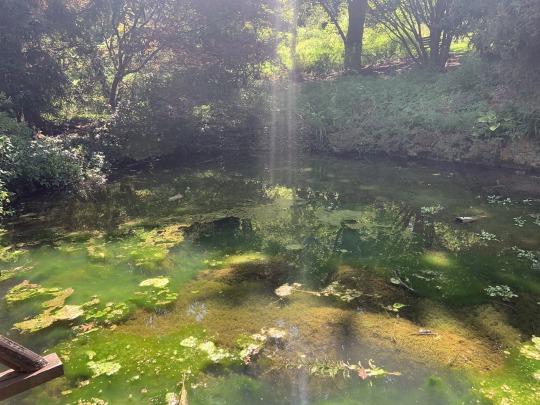
Park near my house where I like to go and paint what I see!
Without artistic interpretations of nature we lack connection, but without scientific interpretations we lack understanding. This is why I believe we cannot simply pick one method of interpretation and run with it.
As an interpreter I believe that I have many responsibilities. First of all it is my responsibility to ensure that everyone feels included. This involves unpacking invisible knapsacks as learned in week three. Making sure that each and every participant has the same tools available to them, either literal or metaphorical, to truly understand and appreciate what is around them is key. If someone felt like they were at a disadvantage due to a lack of education, experience, or anything else then they would not be properly able to enjoy nature as they may be feeling othered. It is a responsibility of mine to be extra observant and make sure that this does not happen. Another responsibility I carry is making sure that everyone is being respectful with the natural world, myself included. Whether it's leading a hike or a camping trip or anything else outdoors there is a possibility for people to treat nature unkindly. Maybe it's by throwing their food wrappers on the ground or unnecessarily killing bugs around them for being “creepy”. When we are in and around nature it is our responsibility to treat it with care so that future generations can have the same experiences as us. As an interpreter I feel a sense of leadership and responsibility that includes keeping our forests, beaches, and other environments clean. Another responsibility of mine is to appeal to each and every learning style. In the course content we discussed tactile, auditory, and visual, but the textbook goes on to provide many others. Things like logical-mathematical, inter- and intrapersonal and many more were mentioned (Beck et al., 2018). I feel it is my duty to truly understand what each one involves and what strengths/weaknesses someone with that learning style may face when it comes to interpretation. A final responsibility I feel I have as an interpreter relates to what I wrote about above. I feel it is my duty to ensure that all aspects of interpretation are being included when out in nature. Providing the science behind why something is the way it is then going into artistic interpretations of it to make sure that everyone gets the whole picture is key. In the future I will strive to interpret in a way that incorporates it all to give participants the best shot at finding something they can connect to in nature.
As an individual I feel I am best suited to do all that I have mentioned in this blog. I am a science student which helps me with scientific interpretations, but I also have a love for being creative which would help me with the artistic part. I definitely feel as though these weekly blog posts have helped me better understand who I am as an interpreter and what works best for me. I have learned quite a bit about myself during this course and I cannot wait to use all that I have learned in the future to be the best interpreter I can!
I cannot wait to read everyone else’s blogs this week and I hope everyone has a great rest of their semester!
References
Beck, L., Cable, T. T., & Knudson, D. M. (2018). Interpreting cultural and natural heritage: For A Better World. SAGAMORE Publishing, Sagamore Venture.
van Boeckel, J. (2015). At the heart of art and earth: an exploration of practices in arts-based environmental education. Environmental Education Research, 21(5), 801–802. https://doi.org/10.1080/13504622.2014.959474
Wals, A. E.J., Brody, M., Dillon, J., Stevenson, R. B. (2014). Convergence Between Science and Environmental Education. Science 344,583-584. 10.1126/science.1250515
13 notes
·
View notes
Text
Hey Lucy,
I really enjoyed your post this week, I feel like it really told a story! Thinking of nature as having a secret language is a super interesting take that is definitely going to stick with me from now on. Tree roots connecting with fungi to create an underground interface is a perfect example of this. Nature is in constant communication! I really like how you mentioned High Park as well as it is a place that holds a lot of wonderful memories for me. Growing up my family and I would constantly visit it to go to the zoo, play in the playground, or walk our dogs in the park. I remember always being in awe at the size of some of the trees and being perplexed at how this much beauty could exist in such a busy urban place. This summer I was lucky enough to visit Central Park in New York with a couple of my friends and felt the same way. Being on the bustling streets of New York City and walking a block into what seemed like a utopia was definitely a profound experience for me. I got to spend the day laying on the grass enjoying the sun shining through the large trees and listening to the sounds of the ponds nearby. Looking back on it now while considering the communication taking place right under my nose definitely makes me appreciate it even more.
Thank you very much for sharing your favourite part of nature! It has definitely made me rethink many of my experiences in nature.
Have a great weekend,
Francesca :)
unit 09 blog post
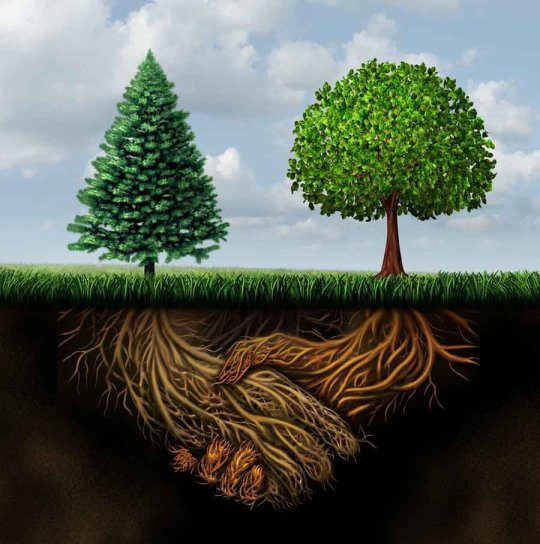
Picture entering a forest—not just any forest, but one where each branch and leaf appears to be alive and whispering secrets that only the most perceptive can decipher. Every sound seems to be a part of a vast, unseen symphony, and the air is thick and moist with the smell of the land. Nature is more than just a setting here, under the canopy; it is a cosmos with countless tales to be told.
Nature's subtle communication between its organisms, known as its secret language, is one of its most amazing features. Imagine trees, silent and towering. Although they may appear to be lone giants to you, they are anything but. Trees connect to one another via a network called the "Wood Wide Web." Their roots entwine with fungi underground, establishing symbiotic relationships that enable them to exchange water, nutrients, and even insect alerts. Through these fungal linkages, when one tree is attacked, it notifies other trees in the area to increase their defences. The forest floor is equipped with a system of resistance, support, and survival.
The wonders of the forest, however, extend beyond its foundation. Above earth, the trees reach the sky, sheltering a variety of organisms that contribute to the forest's harmonious ecosystem. Birds bring liveliness to the atmosphere with their colourful feathers and melodic sounds. Their songs are intricate messages that identify territory, call for mates, or alert others to danger. They are more than just lovely sounds. Every trill and chirp is a note in the survival orchestra. The discourse between the trees and the organisms they harbour is practically audible if you close your eyes and listen.
Even the light has a role to play here. Beams of sunshine shine through the canopy as morning emerges, creating patterns on the forest floor and shedding light on lichen and moss patches. It serves as a gentle reminder of how nature keeps everything in balance, with each component supporting the others to create a peaceful ecosystem that has flourished for thousands of years.
Every time I go to Toronto's High Park, I get a little bit of this magic. It's incredible how entering this area of nature, even in the middle of the city, can make you feel as though you're a part of something living and ancient. I long for the sensation of calm and connectedness, which is brought by the cherry blossoms in the spring, the birdsong in the morning, and the soft rustle of leaves. I feel as though I'm connecting with the same web of life and the same ageless rhythm that throbs through untamed forests as I go along the paths or sit peacefully in the shade.
Nature isn't just "out there" in some far-off wilderness; it's right here, approachable, and equally important, as High Park reminds me. My respect for the tenacity and balance of the natural world is renewed with each visit, and it also sort of helps me find some balance in my own life. We are all a part of something much bigger—a symphony of life, in which each of us plays a crucial note—and nature, in all her unadulterated beauty, teaches me patience and connection.
7 notes
·
View notes
Text
Unit 9 Blog Post -The Ability of Animals To Create a Home
Interpret (through this blog) the most amazing thing you know about nature – get us excited. This is your blog – you audience isn’t out in the field with you so bring the field to your armchair reader.
One of the most amazing and intriguing things for me about nature is the ability of an animal to make its home. Whether it's weaving intricate nests, secreting what they need to make a shell, or digging for miles underground to make a den, animals always seem to find a way to create a resting place. This to me is a particularly beautiful thing and I often like to look at human houses in a similar manner. We build, decorate, and live in these spaces that provide us what we need to live comfortably. We too always find a way to make a home.
A prime example of this for me is seen in caddisfly larvae. During larval development these insects build cases to keep themselves safe (Mouro et al., 2016). Usually these cases are made of silk that they secrete in addition to materials from their surroundings such as sand and mollusk shells (Mouro et al., 2016). These insects have the natural instinct right from the beginning of their lives to create a home in order to stay safe. This for me shows that it is our nature to do so. Even though the stakes are a lot higher for wild animals (life or death) it is still nice to think about the similarities in our home building activities too. A particularly beautiful thing that I have seen in caddisfly larvae is actually a tie-in between art and nature. A french artist by the name Hubert Duprat actually supplied caddisfly larvae with gold and precious stones to see if they would use them to create cases; the results are pretty stunning.
Another example of the amazing home-building behaviour in nature is seen in penduline tit birds. These birds, commonly found in Eurasia, North America, and Africa build hanging nests from tree branches that are very complex. The birds actually get their name from these nests as they hang like a pendulum (Peacock, 2023). These nests are small, hollow ovals with an inside portion completely enclosed (Peacock, 2023). They even usually have a fake entrance in case a predator were to enter! It leads them to an empty compartment of the nest. Seeing the complexity and thought that goes into creating a home to hatch young is a pretty beautiful thing. Going as far as to incorporate safety measures so that your young hatchlings do not get attacked by predators just adds to it.
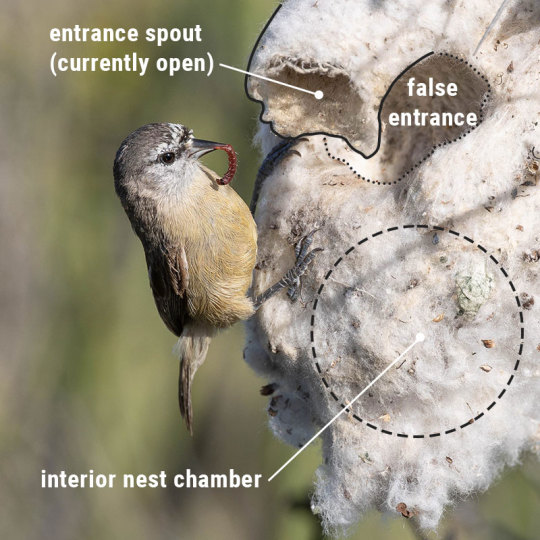
The last example I want to share is the underground burrows created by colonies of naked mole-rats. These rather funny looking creatures are eusocial species, they work cooperatively to survive, usually in colonies of around 80 individuals (Bromham & Harvey, 1996)! Naked mole-rats, who are basically blind, dig complicated burrows underground that can span four kilometers (Smithsonian, accessed November 8, 2024). These tunnels branch and interconnect and even have designated turnaround points (Smithsonian, accessed November 8, 2024). Working with a large colony to make a complex structure to live in and raise young is one of the prime examples of animals' abilities to make homes.
Nature is full of many wonderful things and I could go on forever about all my favourite ones. However my favourite thing about nature is definitely the home-building ability of animals. It makes me really happy to learn about the different methods that different species use to create their homes and what they use them for.
References
Bromham, L., & Harvey, P. H. (1996). Behavioural ecology: Naked mole-rats on the move. Current Biology, 6(9), 1082–1083. https://doi.org/10.1016/s0960-9822(02)70671-4
Mouro, L. D., Zatoń, M., Fernandes, A. C. S., & Waichel, B. L. (2016). Larval cases of caddisfly (Insecta: Trichoptera) affinity in early Permian marine environments of Gondwana. Scientific Reports, 6(1). https://doi.org/10.1038/srep19215
Naked Mole-rat. Smithsonian’s National Zoo and Conservation Biology Institute. (2016, April 25). https://nationalzoo.si.edu/animals/naked-mole-rat#:~:text=Naked%20mole%2Drats%20live%20in,feet%20(2%20meters)%20deep.
Peacock, F. (2023, November 22). Perplexing pendulines. faansiepeacock.com. https://faansiepeacock.com/perplexing-pendulines/
0 notes
Text
Hi Nithira,
I really enjoyed reading your post this week. I also feel like I was not very aware of how musical nature was growing up, but have since become very in tune with it. I like how you mentioned that technology can help us experience music in nature as technology is often thought of as the antithesis of nature. Mentioning the bear cams at Katmai National Park is a great example of this and makes me want to check them out!
I also agree that the sound of rain has a special musicality to it. I have fond memories of visiting my cottage and sleeping under the trailer roof while listening to the ping of raindrops hitting it.
As for the song that immediately reminds you of nature, ‘Landslide’ is a classic pick! I feel like it really captures the feeling of a wooded hike on a foggy day, at least in my interpretation of it. It has a very autumnal feeling and is on repeat in my house as soon as the leaves start changing colours. The lyrics of the song mention many natural processes such as changing seasons, climbing mountains, and snow covered hills (along with landslides of course). While these are all metaphors the mere mention of them makes the song feel like a warm fire and the smell of fall. I feel like many of Fleetwood Mac’s songs evoke the same feelings, another favourite of mine being ‘Songbird’.
Once again I really liked your post and learning about your favourite nature-feeling songs. Thank you for sharing!
Happy Thursday,
Francesca :)
Unit 7 Blog Post
If there is one thing I have definitely learned from nature, it's that it always has something to say, even if we don't always notice it at first. I've always been drawn to the sounds of the world, from birds chirping in the early morning to the rustles of leaves. The music in nature is in the patterns and tempos that fill the world around us, from the flowing rivers to the hum of the wind. Growing up, I didn't realize how musical these everyday sounds really were, but now, I can't help but see how much nature and music are intertwined and as an aspiring nature interpreter, I've started thinking about how to help other's make that connection too.
The textbook reading this week reminded me of the innovative ways technology has been used to bring people closer to nature. For instance, the "bear cams" at Katmai National Park allow people to experience the natural world remotely, and it's fascinating how viewers have created "online communities and chat rooms focused on bear management and conservation" (Beck et al., 2018b). I also recently visited the Arcadia Earth Exhibit in Toronto, which is a multi-sensory experience using creative art pieces and technology. There was also a virtual reality experience that allowed people to view natural habitats of animals and immerse yourself in their world.
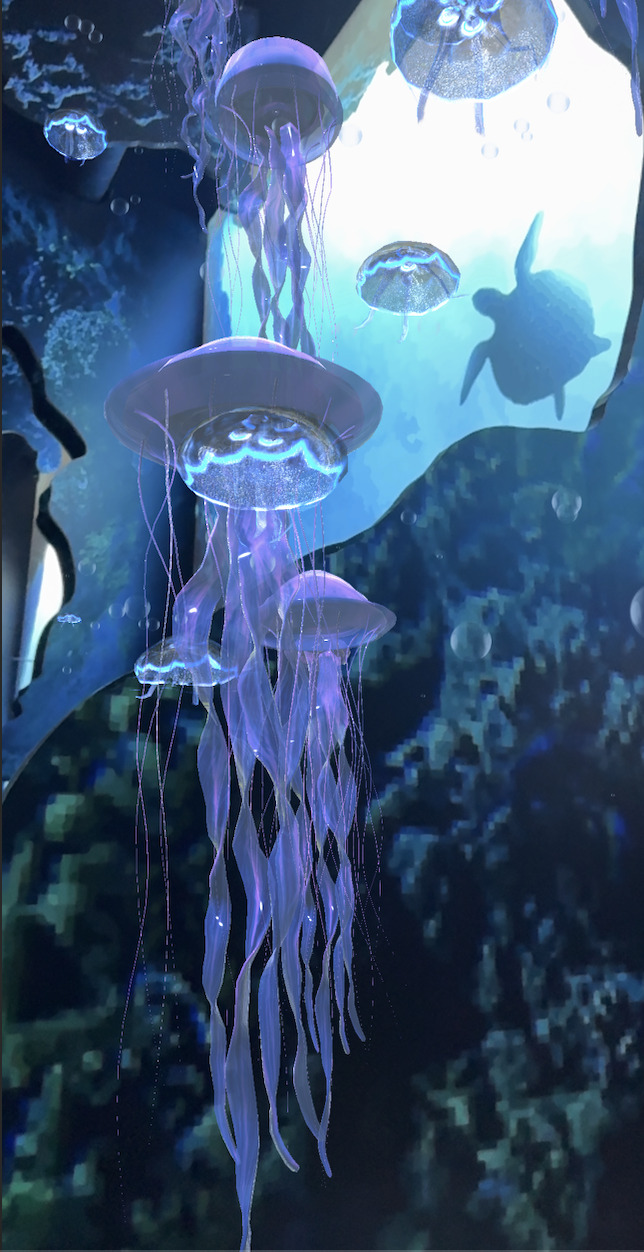
As an interpreter, this makes me realize the potential we have to use media to reach a much wider audience, even those who can't physically visit these natural spaces. Similarly, music has the power to transport us to a place, to evoke the feeling of being with nature. Nature is in the melodies and harmonies that echo the sounds and emotions of the environment. The sound of rain is particularly one of my favourites. A single note can remind us of a raindrop. Interpreters are constantly learning how to use media to expand their audience, just like musicians often look to nature for inspiration. This connection, whether it's facilitated through webcams, social media, an exhibit, or music, can inspire a deeper appreciation and commitment to conservation.
For me, music has always been an escape and sometimes a bridge to nature. Two songs that instantly take me back to a natural landscape is "Landslide" by Fleetwood Mac and "Canyon Moon" by Harry Styles. Every time I hear these, I picture quiet hikes through the woods in the fall, with leaves crunching and the crisp, cool air that just wakes you up. Specifically I think of a time in my backyard in autumn. I was with my dog playing in the raked leaves with him, with gentle wind and my family's laughs and I remember these songs in the background. Both pieces are calming, reflective songs that mirror nature's rhythm itself, with all of its changes and adaptation. Nature never rushes, and that's a lesson I take with me in my work as a nature interpreter, everything unfolds in its own time.
Nature is woven in the melodies that help us feel connected to the world around us. Whether an interpreter or just an observer, I find that music and nature are bonded.
Beck, L., Cable, T. T., & Knudson, D. M. (2018a). Interpreting cultural and natural heritage : for a better world. Sagamore Venture.
1 note
·
View note
Text
Unit 7 Blog Post
Where is music in nature? Where is nature in music?
As a follow-up (focus on the above two before you tackle this one), what song takes you immediately back to a natural landscape? What is the context? Share it with us – I would imagine many of these ideas may have similar underpinnings of a campfire, roadtrip, backpacking journey, etc.!
After leafing through this week's assigned readings and course work I have come to understand that music is everywhere in nature. From chirping birds to the sound of thunder crashing in the atmosphere, nature has created a symphony of sounds that are easy to forget when thinking about music in nature. At the end of the day though, all of these sounds are parts of the orchestra of nature that create the soundtrack for our everyday lives. In an article written by Patricia M. Gray et al (2001)., they explain that music involves patterns of varying sounds produced for emotional, cultural, social, and cognitive purposes. Under this definition things such as leaves rustling may not count as music as it was not “created” for any of those purposes. However, they go on to describe a few examples where nature is intentionally creating music. Humpback whales are one of these examples. They use rhythms, phrases, scales, and many other components of music that we also use (Gray et al., 2001).
It is easy to tune out the everyday sounds created by nature and I am a culprit of it too. Often while on a walk I will have my earbuds blasting some Taylor Swift or Hozier that effectively drown out the wind, birds, squirrels, and any other music nature may be creating. By doing this however I am missing an integral part of nature interpretation. Many of the everyday sounds that nature creates are intentional and forms of natural music which should be considered when interpreting nature as a whole.
Since music is everywhere in nature, it makes sense that nature is visible in music. As mentioned in this week's content, there are musicians out there incorporating natural sounds such as birdsongs into their music. An example that comes to mind for me is the common loon call that I have noticed in many artists' songs, specifically Doja Cat. I was listening to her album ‘Planet Her' a little while ago and noticed that many of the songs either started or ended with a loon call. After doing a little research I believe that it is the producer tag on the song which was very interesting to me. After noticing this I have become more aware when listening to music by my favourite artists. I have since noticed nature in many songs, such as the sound of cicadas buzzing in the songs ‘Solar Power’ and ‘Oceanic Feeling' by Lorde. I will link these songs in this blog so you can take a listen and try to hear what I am talking about!
There are many songs and albums that take me back to nature immediately upon listening. The first of these is both the song and album ‘Solar Power’ by Lorde (as mentioned above). Both the album and the song to me encapsulate the feeling of being outdoors in the summertime. Lorde incorporates many natural sounds as I mentioned above which all come together to create a strong sense of sunny summertime joy for me. It is probably my most listened to album and song every summer. Additionally, I feel connected to nature when I listen to many of Hozier’s songs. From ‘Work Song’ to ‘In a Week’ and ‘Through Me (The Flood)’, Hozier creates a soundscape that makes me feel like I am in the Earth as silly as that sounds. He creates a lot of imagery about decomposition in the dirt surrounded by worms and his most recent album cover actually depicts him buried underground. It is definitely a very different vibe than ‘Solar Power’ but works the same in reminding me of nature. With Hozier however I feel like his music is more associated with the changing of leaves and general fall vibes.
Gray, P. M., Krause, B., Atema, J., Payne, R., Krumhansl, C., & Baptista, L. (2001). The Music of Nature and the Nature of Music. Science, 291(5501), 52. https://link.gale.com/apps/doc/A69270354/AONE?u=guel77241&sid=bookmark-AONE&xid=fb9366a8
1 note
·
View note
Text
Hi Abbey,
I really enjoyed your interpretation of the quote by Edward Hyams. This quote really does highlight the importance of the “bigger picture”. I like how you also included the future in your description as what is currently our present will soon become the past. We should be anticipating what the future holds.
You also did a great job at unpacking the first part of the quote where he mentions that things do not have merit just because they are old. By taking the time to understand the things that have happened over the decades in an old building we stumble upon, it truly enriches our interpretation of it. Instead of something being cool just for being old it becomes cool for all of the history that it holds. In your example of an old building the interest comes from thinking about all of the people that have passed through and what their lives and interactions looked like at each time. Including historical interpretation truly does bring life back to what once was.
Using the past to educate our future is also very important. Being able to remember and recognize mistakes that we have made on the individual, and group, level allows us to avoid making the same mistakes again. Mentioning our past actions that have contributed to the planet's current health status is a very good way of bringing this quote back to our course of nature interpretation. We must not forget our previous actions that have contributed to the climate change we face today.
This post was very insightful to read, thank you for sharing!
Francesca :)
Blog Post 6
“There is no peculiar merit in ancient things, but there is merit in integrity, and integrity entails the keeping together of the parts of any whole, and if these parts are scattered throughout time, then the maintenance of integrity entails a knowledge, a memory, of ancient things. …. To think, feel or act as though the past is done with, is equivalent to believing that a railway station through which our train has just passed, only existed for as long as our train was in it.”
(Edward Hyams, Chapter 7, The Gifts of Interpretation)
The quote above illustrates the importance that looking at the “big picture” holds. When looking at an aspect of nature this so-called big picture includes all aspects including the past, present and future. Without all the pieces of the puzzle the integrity of the interpretation is lacking. I think that this quote reflects that just because something isnt happening right now does not mean it didn't have any effect on what is. What I mean by this is that without the past what currently exists would differ. For example let’s say your great great great grandparents moved from say Australia to Canada. Since then your family, school, work and social life has become established in Canada. When looking at these aspects it may seem as though the history of your family doesn't play a role. But in reality if these great great grandparents didn't move to Canada your “story” would be much more different.
To be able to fully understand and unpack your surroundings it is important that you look at everything that was put into it. The beginning of the quote there is no particular merit in ancient things. When looking at an old artifact and only knowing it for what it is currently such as an old building or something it loses so much of its “wow” factor if you will. It may just seem like a pile of junk with no value, but if you dive into the past of the building you are able to uncover this story of who, what, where, when and how. This makes the building much more interesting and the overall interpretation of the building will be different. In chapter 15 of the Interpreting Cultural and Natural Heritage: For a Better World textbook the author did a wonderful job explaining this. The chapter explains that including historical interpretation almost brings life back to what once was and deepens our understanding of the historical elements.
No matter what, the past is always with us and shapes us into the people we are today. The same is true about nature and the impact that we have on it. We can use historical information to educate ourselves on the past so we are knowledgeable for what the future may hold. This can be said about the issue we are currently facing of climate change. If we look at this in the context of Hyams' metaphor about the train station it would be as if we said that all the emissions and harm we have done to our planet in the past is not relevant to the current concern of climate change. When obviously this is not the case. Instead when looking at the issue of climate change we have to look past activities and how they have contributed. Imagine if we were only looking at our current emissions rates, etc and had no historical data? There would not be nearly enough information or knowledge base to make sound decisions about the serious problem at hand. It might not even look as if it is a problem. For reasons such as this it is necessary to include history in interpretation, without it you're doing it an injustice. History plays a role in everything, ensuring it is part of every interpretation strengthens the overall understanding and improves accuracy of the information being presented.
1 note
·
View note
Text
Unit 6 Blog Post
There is no peculiar merit in ancient things, but there is merit in integrity, and integrity entails the keeping together of the parts of any whole, and if these parts are scattered throughout time, then the maintenance of integrity entails a knowledge, a memory, of ancient things. …. To think, feel or act as though the past is done with, is equivalent to believing that a railway station through which our train has just passed, only existed for as long as our train was in it.
(Edward Hyams, Chapter 7, The Gifts of Interpretation)
Unpack this quote.
This quote by Edward Hyams discusses the importance of history in relation to the goodness of life. In the first part when he says, “There is no particular merit in ancient things, but there is merit in integrity,” he rejects the idea that old things are valuable just because they are old. An ancient artifact is not important solely because it is old. He goes on to say that there is merit in integrity which involves the “keeping together of the parts of any whole”. From his perspective, there is goodness in integrity through the completeness of something. The unity of something in its entirety, its “completeness”, is what has value and importance in a historical context. In order for integrity to be maintained, that unity must also be maintained over time. The “parts scattered throughout time” are pieces of history being shared, ignored, implied, and included, as mentioned in this week's unit. These pieces of history may be lost over time if they are ignored or implied, which is why there is an inherent goodness in the maintenance of something over time by taking extra care to retrieve those lost pieces. In today's world there are many “pieces of history” that have been lost over time. Fables, stories, and teachings from different cultures and religions are examples of these things that can be lost over time. It is difficult to think about all the knowledge that we have lost over the centuries due to our rapidly changing world and history of intolerance/violence against others. Luckily however, there are those who strive to recover what has been lost and continue interpreting. When I think about this history of losing parts of a whole I think about what stories the world will never get to hear due to Canada’s history of mistreatment against Indigenous communities. The people that work to put the pieces of the puzzle back together are included in the merit of integrity.
Preserving integrity requires remembering, understanding, and interpreting the ancient elements as evidence. As learned in class this week, “natural history has been about creating a story based on evidence.” As interpreters of nature we need to be able to understand everything that has come together into making a piece of nature what it is today. An example of this would be understanding the history behind giant sequoia trees in a place like Yosemite. When seeing them in person you easily get wrapped up in the size of them and I believe it naturally makes you think about the time it took for them to grow so big. As interpreters we must be able to relay this information to others. The oldest tree in Yosemite is over 3,000 years old (Yosemite.com, retrieved October 19, 2024); being able to remember and understand what has, and may have, happened over those thousands of years is key to providing more personal experience to those visiting the trees. Forgetting or ignoring the past would ruin the wholeness of the present, because all of what came before contributes to what exists now.
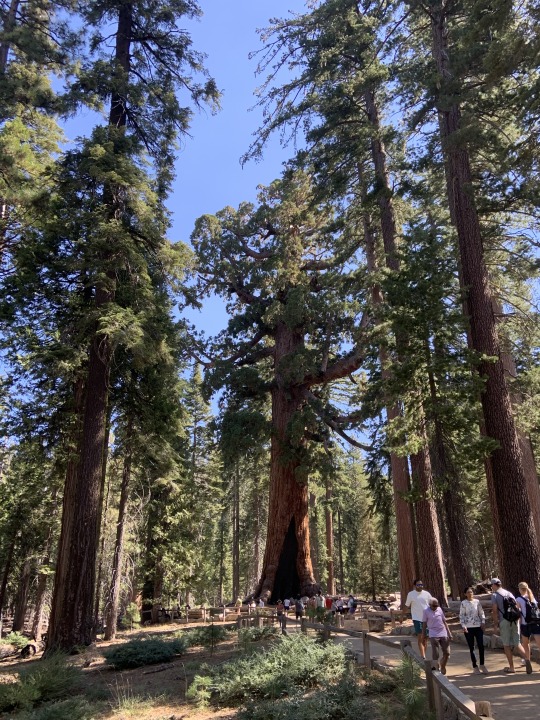
Giant sequoias!
In the final part of this quote, Hyams uses a metaphor of a train station to further prove this idea. The past does not disappear just because we are now in the present, no matter how long ago it was. As a train station continues to stand after our train has left, the past stands even though we are no longer directly there in it. Ignoring or forgetting the past is the literal version of the metaphorical train station disappearing just because we left it.
All in all, this quote by Edward Hyams pushes us to remember the past and everything that has led up to where we are now in order to fully appreciate our current place in time. Each piece of our natural history has led to every tree, blade of grass, animal, and everything else that we see around us today.
0 notes
Text
Hi Owen,
I really enjoyed reading your post. It was very relatable for me (and kind of reassuring to know others worry about what I worry about).
I completely get what you mean about preferring to stay in your comfort zone as a result of OCD and other mental factors. I believe I am a decently introverted person and just generally awkward to be around sometimes but then I feel like it may all just be in my head. I have been trying to get out of my comfort zone a bit more and, even though it is very stressful, I have not been completely hating it. I have met a lot of new people this semester and really enjoy talking to them. I also relate to your worries about not being enthusiastic enough to be a nature interpreter, I guess it is probably just a cse of imposter syndrome. However, similarly to you, I also have some previous teaching experience (as a camp counselor in my case). I spent many summers doing the thing I was worried about not being able to do, teaching others. I feel like this experience is very beneficial for both of us and probably helped us both step out of our respective comfort zones. I think just the fact that you are able to articulate what about nature makes you feel comfortable or what you enjoy most proves that you would be a great nature interpreter!
Thank you once again for sharing, it is nice to know that I am not the only one worrying about my identity as a person and a nature interpreter.
All the best,
Francesca
Blog post 5
I wasn’t expecting a free prompt this week, but I honestly appreciate it. I’ve had a lot on my mind, and I’m happy to relate it back to environmental interpretation too.
I guess what I’d like to talk about this week is… Identity. Who am I? No, seriously, who am I? I have trouble describing myself when asked. I understand a part of this issue is dissociation and uncertainty brought forth by my OCD, which likes to search for a solid answer that I’ll never receive, but I find myself asking this question nonetheless. I feel I’ve been held back by my OCD especially, which would rather I stay in my comfort zone than ask difficult questions. But there’s surely more waiting for me, beyond this prison I call “comfort”.
I’ve asked myself this question a lot in relation to my career, and my exploration of environmental interpretation. I wasn’t quite sure what I wanted to do, getting out of high school. I was generally pretty good at everything I took (except french), so I had plenty of options. But I didn’t know. Even my eventual choice, Marine and Freshwater Biology, was just based off of a hunch that learning about nature was the most interesting of my options. So where am I now? I’ve gotten to explore my interests a lot these past few semesters- I’ve been taken to the west coast (BC) for a co-op to study snails, and to the great lakes for another to study plankton. And piece by piece, I build a better idea of what kind of person I am- for starters, I don’t quite think I’m a researcher- But I still love nature and sharing that enthusiasm for nature with others. Perhaps an environmental interpreter is in my future?
That said, I’ve had my doubts about that, too. Am I really enthusiastic and outgoing enough to be an environmental interpreter? Would I know what to say? To do? I was stumped by this. And for a little while I questioned whether this course was even for me. But the last discussion post was a great one. It was interpretive, like art is in general, and being able to describe the beauty I saw in nature was euphoric. I was reminded of the times where I found myself lost in nature, such as back on the west coast watching the waves collide with the rocky shore, and another time in Mexico watching the clouds above a jungle treeline. I think there’s a lot for me to appreciate, and even better, I can share that appreciation with others! I have experience teaching, it’s not too unfamiliar to me- I work part time as a swim instructor, and can definitely show enthusiasm to a small audience about the things I’m knowledgeable in. Of course, that would mean I need to learn quite a bit more. Perhaps in my work I’ll find a particular subject I’ll excel in, and be able to talk and present about that.
There’s a lot of possibilities! And each step I take to find something that works for me is another step closer to better understanding myself, as a person and an interpreter. I can’t wait to be myself!
1 note
·
View note
Text
Unit 5 Blog Post
This week we have no prompt for our blog post so I wanted to write about the things that make me feel most connected to nature. They are all very random and specific so bear with me. I am not sure why the things that make me feel most connected to nature do so, it is just a feeling I get that I am trying to describe.
The first of these things would be the ocean. This summer I was lucky enough to visit both the Atlantic and Pacific oceans and it was very special for me. I am not around any oceans that often so I had somewhat forgotten the beauty of them but as soon as I saw/smelled the ocean in the distance I remembered what I was missing. I try to describe why they make me feel the way they do and I think it may just come down to the vastness of it all. Staring out at the seemingly endless ocean puts things into perspective for me as I think about the amount of life within it. I got to see some of their inhabitants like seals, otters, whales, and a whole bunch of invertebrates (my favourites). It was very special to get to be in and near the oceans this summer and I loved getting to put my knowledge to the test as a marine and freshwater biology student. Since coming back to Guelph it seems to be the only thing I think about most of the time and I really hope I can live near an ocean in the future.
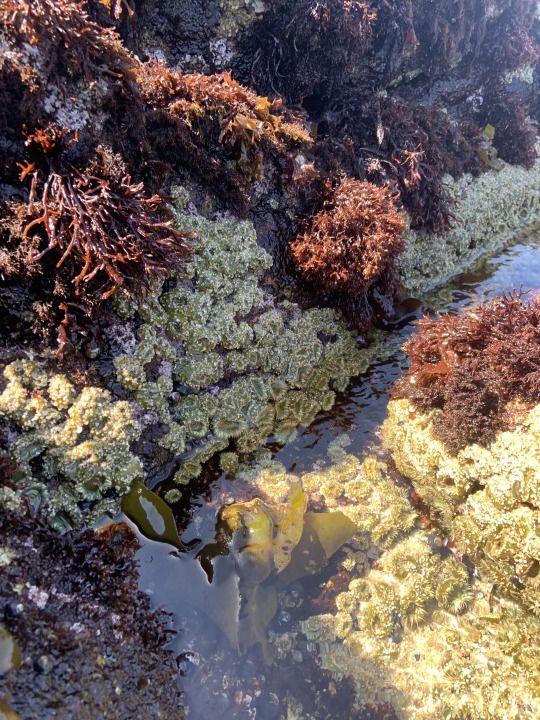
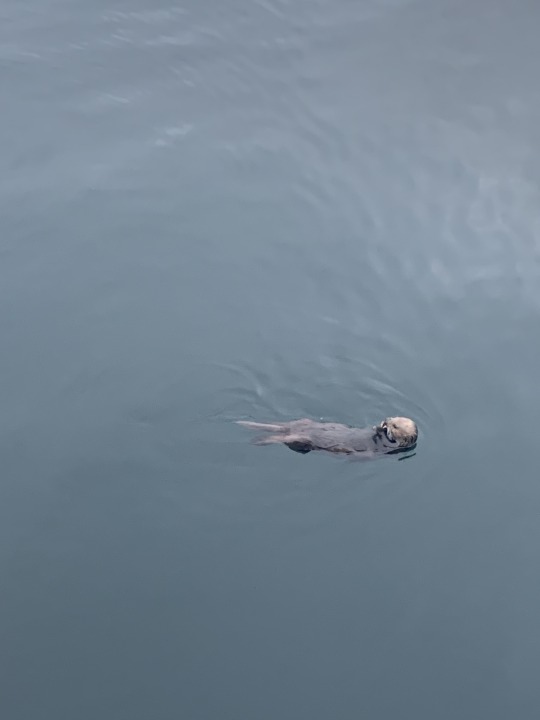
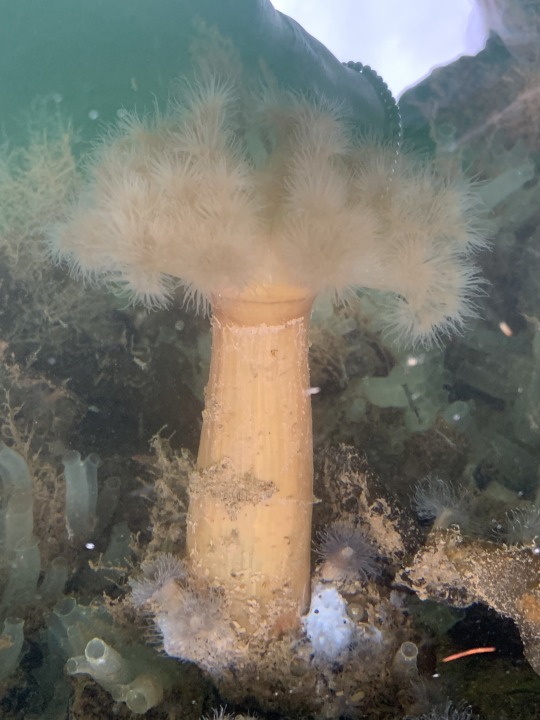
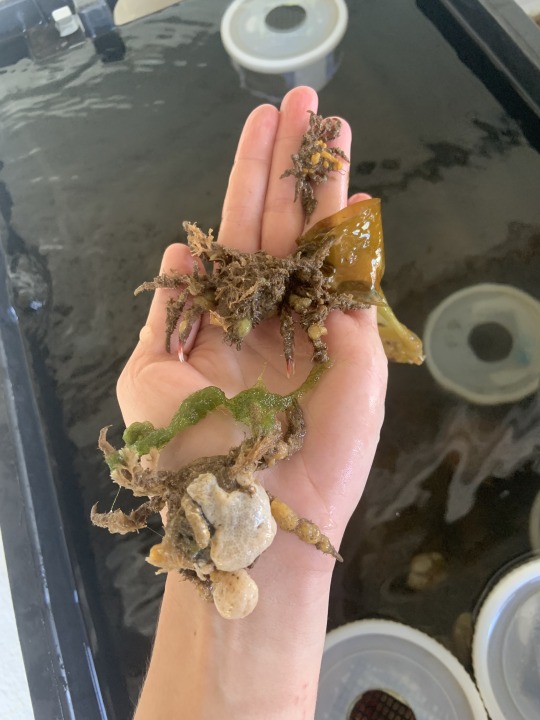
Some friends I met in the Pacific (top row), and Atlantic (bottom row) oceans this summer!
The next part of nature that I feel especially connected to are rabbits. This feels a little silly to be writing about but I am following our no prompt theme of what we are thinking about. I do however know why I feel especially connected to rabbits and that is because I had a pet bunny for eight years when I was younger. He was always around during my formative years and obviously left a huge mark on me which I did not realize until I was older. Now whenever I see a rabbit on someone's lawn or running in the woods it pulls on my heartstrings and I have to stop and be near them for a bit. I just think they are very peaceful and gentle creatures that actually have a lot of personality. I love watching them interact with their environments by munching on grass or just laying around. I see the beauty of nature through rabbits, so much so that I have a tattoo of one!
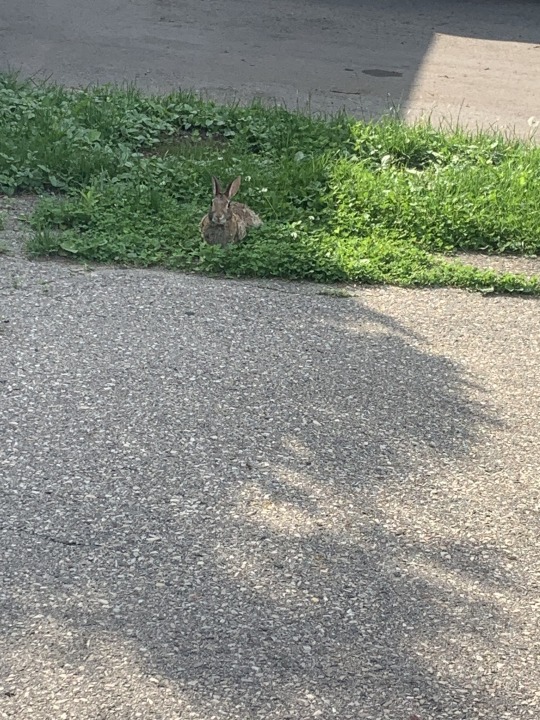
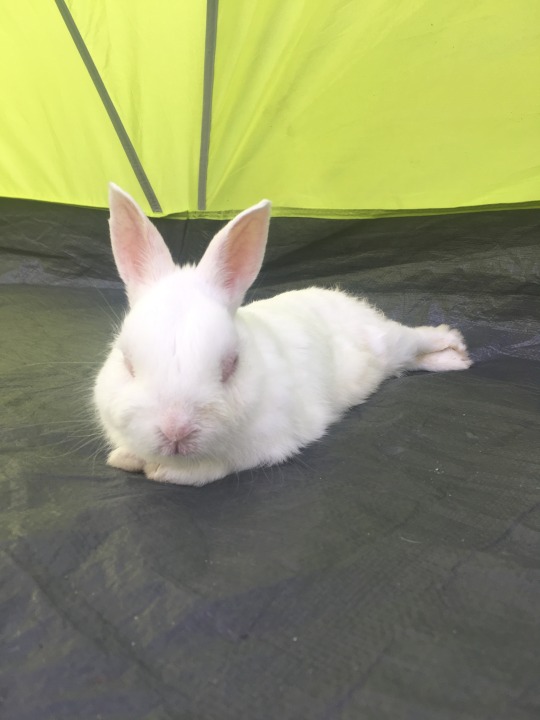
Rabbit on my lawn recently (left), my rabbit (right)
My list of specific nature-related favourite things goes on forever but if I had to narrow it down to two it would be those. I am still searching for a way to describe why I feel the way I do and what exactly that feeling is so maybe someone here has some insights on it? Also, I would love to hear what specific things make everyone else feel extra connected to nature!
Thanks for reading my ramblings. I hope everyone has a great Thanksgiving!
-Francesca :)
5 notes
·
View notes
Text
Hi Emily,
Wow, I really enjoyed reading your blog this week. I think you offered great perspectives both from being an art history minor and with your incorporation of indigenous arts. Taking the time to try and understand the backstory of a piece and consider all that may have contributed to the final product is very important and definitely not talked about enough. I had no idea that the Group of Seven was not depicting the actual landscapes they saw. I know that it was not a hyper-realistic depiction of the scenery because they had a very specific art style, but learning that they were ignoring the logging and pollution in the areas was very interesting.
I also enjoyed you mentioning the different learning styles and incorporating that into how we interpret art. Museums do offer a bit of something for everyone, not just visual learners which is why art is such a valuable way to interpret nature.
While I agree that social media and the internet definitely do make the wonders of nature seem less exciting, I think it may also connect us to it more in some senses. Obviously nothing beats being outdoors and experiencing it first hand, but getting to see what your friends are experiencing is also a way of interpreting nature through their lens. It allows us to see things we may have missed or view parts of nature not accessible to us. An example of this is when the northern lights were super visible across Canada this summer. I was at home in Toronto and therefore could not see them because of the light pollution, but my friends who were scattered across the country for work sent me photos of the gorgeous skies. While I was a little jealous, I was happy to see it at all and felt happy for my friends who got to witness it with their own eyes. Due to this I think there are some pros and cons to social media as a nature interpreter.
Thanks again for sharing!
Francesca :)
Unit 4 Blog Post
Hi Everyone :)
With one of my minors being Art History, I have learned to be more of a critical thinker when it comes to interpreting art and nature’s involvement in many of the pieces we view today. How many of these artworks are ethical, original, and ephemeral? I try my best to see the beauty in nature through art, while also giving myself the grace to understand the backstory to the piece/landscape. With today being the National Day for Truth and Reconciliation (Orange Shirt Day), I’ll touch on Indigenous art and how we’ve done a disservice to Indigenous talent in Canada’s art world.
In terms of the Group of Seven who really put Canada on the map via showcases in predominantly Canada, The United States, and Europe. Their art expanded worldwide and pretty much dominated galleries in Canada for decades, pushing out other artists and Indigenous works. In hindsight we can understand that their more popular pieces did not exactly depict Canada for what it was at the time. Many of their landscapes were painted in Algonquin, Algoma, and out West; where major logging and pollution was occurring. Some of the artists painted scenes of Indigenous communities, but failed to represent the cultural genocide and residential schools tearing those families apart. Canada was depicted as this abandoned land, solely made up of landscapes and tranquility. Moving forward we can look into Indigenous artists to learn about how they interpret nature through art and the concept of ‘the gift of beauty’ through their lens.
Interpreting art in nature is a great way to hit more than one of the learning styles. Even in a gallery setting, a painting can target visual learners, the plaque can offer a description for the readers/writers, and there are auditory options available in most galleries. We can also achieve this in nature interpretation; using multiple learning styles can enhance the ‘art’ aspect of nature and allow us to encompass some additional information to a picturesque landscape. This notion ties into the ‘gift of beauty’ and how there is more than meets the eye when it comes to understanding nature through art.
The importance of immersing ourselves in nature is exemplified in Hahn’s Social Declines of Modern Youth. I feel like the use of social media and abundant technology is the culprit of these ‘social diseases’. We are all so accustomed to being able to see whatever we want, whenever we want it. We can google any image of nature and get a million different vantage points of it. I think this allows us to sometimes take for granted the fact that we could go outside and see the beauty of nature with our own two eyes. A big factor in experiencing nature in person is the stimulation of the senses; as opposed to only sight and maybe sound when we view something online. By stimulating all 5 senses in person, the experience becomes more holistic and memorable.
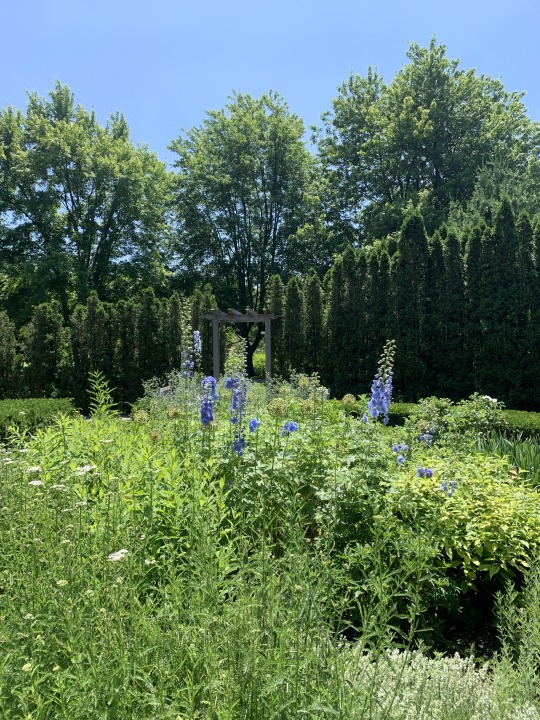
Got off my phone and walked around the Arboretum this summer!
We can only learn from our mistakes as people and as a country. Understanding equality in art, risk in nature, and beauty in our daily lives, is built through the experiences of others; we simply have to listen.
13 notes
·
View notes
Text
Unit 4 Blog Post
Who are you to interpret nature through art? How do you interpret “the gift of beauty”? (Your readings – specifically Chapter 5 of the textbook – will be helpful for this!)
Art has always held a special place in my heart, whether it is painting, photography, drawing, or just going to museums to see what others have created. When considering nature interpretation, it is very clear to me that the two go hand-in-hand. Nature and art are the same thing. This is obvious to me when I see my friends' Instagram stories flooded with pictures of a pretty sunset, or when I stop to take pictures of cool mushrooms I see while on a walk. It is very easy to interpret nature through art because they are synonymous. As a nature interpreter I am able to describe the beauty of nature while out in the field, but also by analyzing depictions of nature in art. Being able to convey what an art piece is telling us about nature we are able to interpret nature to its fullest extent.
In my free time I enjoy going to parks near my house and painting what I see. I believe that this is a very important way of interpreting nature as you are capturing it through your perspective. As we know, art is subjective. Due to this everyone identifies with it differently. By painting, photographing, or drawing nature we are able to share how we see it and share our interpretations when words may fail.
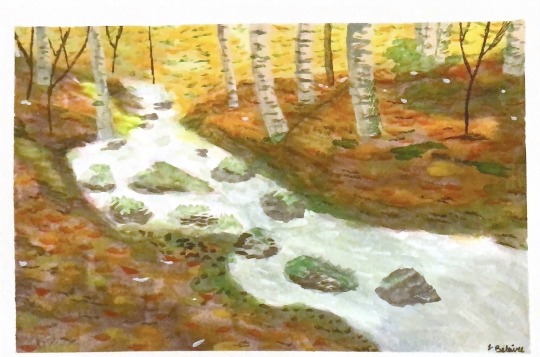
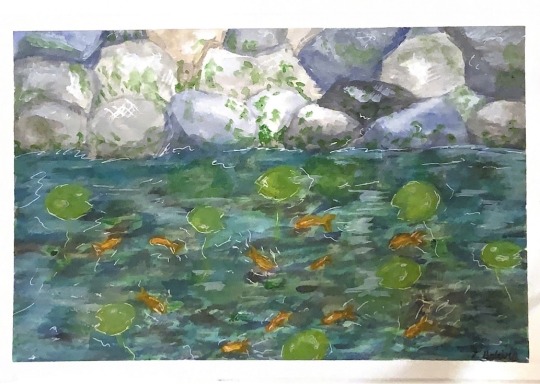
My interpretations of nature through paintings I have done
Personal interpretations of nature through art have existed for centuries with many of the “most famous” paintings of all time being depictions of nature (like Monet’s Water Lilies). The Group of Seven have also created many paintings that portray the beauty of nature as discussed in this week's unit. Through their art, the members of this group were able to capture the beauty of Canadian landscapes to share with the world. Their paintings convey the stillness of lakes, blowing winds, and colours of fall among other things. Each one is a snippet of the environment Canada has to offer and their work is a very prominent part of Canadian heritage. Growing up I remember taking countless field trips to the McMichael Canadian Art Collection gallery with my school. I remember myself and my classmates being astonished by the feelings that these paintings evoked, and even taking time to draw our versions of some of them. By observing these pieces of art and creating our own based off of them, we were able to experience scenery that some of us had never seen before. We were able to get a sense of what it was like to be there without ever leaving the walls of the gallery.
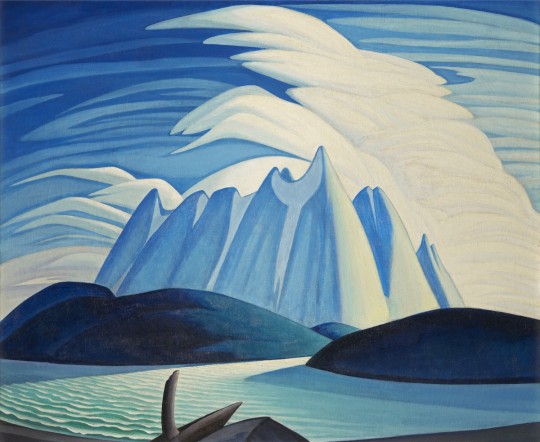
Harris, H. S. (1928) Lake and Mountains [Painting]. I remember recreating this painting specifically
In regards to the “gift of beauty”, I believe that it is hidden (or not so hidden) in nature. We can see the visual appeal of a pretty flower or fall leaves in a forest, but we can also feel it. The beauty of nature comes with emotions; when we imagine a still lake it brings calmness, and when we think of a bright summer day it brings joy. The gift of beauty in nature is the escape that it offers, not just the pretty colours and cute fuzzy animals. By interpreting nature through art we are able to capture that gift and save it for future generations to see, just like the Group of Seven did.
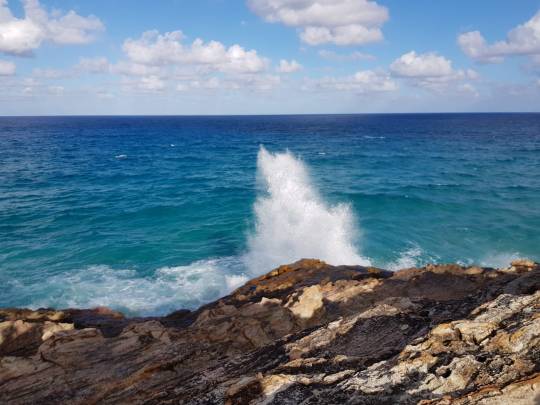
A picture I took in Australia that encompasses the gift of beauty for me
3 notes
·
View notes
Text
Hi Anna,
Your blog post for unit three was super interesting to read, thank you for sharing! I really like your working definition of privilege and your description of how it influences our perspective as interpreters. Similarly, I also reflected on my experiences on outdoor trips growing up. While I never went on any canoe trips, I have been on quite a few camping ones. I think that growing up with these experiences funded for us definitely alters our perception of nature and gives us a bias that others may not have. It is very important to consider that we grew up with opportunities that many did not while trying to interpret nature.
I also really like that you mentioned educational privilege. I am also in the marine and freshwater biology program and have been able to gain a deeper understanding of aquatic systems while gaining hands-on experience in labs and the field. This alters my perspective of the natural world and provides me with a knowledge about it that not everyone has access to. Due to this I think it is super important to consider our educational privilege when communicating ideas about the natural world to our audience. I agree with you that understanding that education is a privilege will better allow us to make nature inclusive and accessible in the future. All of this will hopefully lead to more meaningful and personal experiences for those that we are interpreting for.
Once again, I really enjoyed reading your post and cannot wait to see your blogs in the next several weeks.
Have a great weekend,
Francesca :)
Blog Post 3: What role does “privilege” play in nature interpretation?
Nature interpretation is more than just educating people about the environment; it involves connecting diverse audiences to the natural world. Privilege plays a major role in shaping who gets access to these experiences and how we, as interpreters, communicate with our audiences. I view privilege as the advantages people may have due to factors like race, class economy, or education. These factors can influence who has more opportunities to experience nature and take on roles as interpreters.
Privilege is often invisible, as described by Peggy McIntosh’s concept of the "invisible backpack." This backpack contains resources like education, economic stability, access to outdoor spaces, and even something as fundamental as time. When I think back to my experiences with canoe tripping, I realize that my ability to spend extended periods in the wilderness came from multiple aspects of privilege. I had access to the necessary equipment, the time away from other obligations, and many years of canoe-tripping experience to gain knowledge to navigate these environments. In addition, my supporting parents covered my camp costs. For others, these opportunities might not be as accessible. What was a chance for me to connect with nature could be a distant possibility for someone without the same resources.
In nature interpretation, this matters because we often assume that everyone experiences the outdoors the same way. For example, I’ve had the privilege of growing up with access to canoe trips, fostering a deep connection to the wilderness. However, someone who has never been exposed to nature in this way, due to financial constraints or a lack of exposure to outdoor education, might not have had the same opportunity. As interpreters, it’s our responsibility to understand that our audience comes from various backgrounds, and our interpretations should reflect this diversity.
This extends to more than just material privilege. Educational privilege also plays a role. Education has greatly expanded my knowledge in the Marine and Freshwater biology program, offering me a deeper understanding of ecology, biology, chemistry, etc., and the complex dynamics in these courses. This academic foundation shapes how I perceive and communicate environmental issues. For instance, when I discuss the importance of protecting marine ecosystems from climate change, my insights are influenced by the complex knowledge I’ve gained through school. However, I also recognize that not everyone has access to this level of education. Understanding that my education is a privilege allows me to approach my interpretations with a focus on making them more inclusive and accessible to a broader audience, ensuring that complex issues are communicated in a way that everyone can grasp.
By acknowledging the layers of privilege that influence both the interpreter and the audience, we can create more meaningful and inclusive nature interpretation experiences. My experiences on canoe trips were transformative for me, but not everyone has access to such opportunities. As interpreters, we need to account for the diverse backgrounds and barriers that people may face. Understanding these differences helps us bridge the gap between our audience and the natural world, ensuring that everyone has the chance to connect with nature, regardless of the invisible backpacks they carry.
6 notes
·
View notes
Text
Unit 3 Blog Post
What role does “privilege” play in nature interpretation? Please include your working definition of privilege.
As nature interpreters our goal is to connect with an audience to communicate the wonders of the natural world while educating about specific aspects of our environment. It is very easy to get wrapped up in our learning/teaching styles and ideas for new ways to be an interpreter. However, when all of our focus is on how to best communicate our knowledge, it may be even easier to forget to consider privilege (which is a privilege in itself). In my opinion, privilege is defined as the advantages given to a person based on their race, gender, orientation, class, education level, and other factors. Notice the use of given in the previous sentence. Privilege is not something that people work for but something handed to them by society. When we fail to consider the effects of privilege on people's perspectives, we are failing to be proper interpreters.
As discussed in Unit 3 of this course, and as Peggy McIntish suggested, every person has an “invisible backpack” that we carry around every day. Invisible backpacks are basically our tool kits for getting through life. All of our privilege is held in them and can be used as needed for an easier life. While reading through this chapter of our course I was able to take some time to reflect on my invisible backpack and the privilege that I have.
Growing up I always had access to nature through summer camps, camping trips, vacations, and kayaking on the river near my house. I realize that all of these are opportunities provided to me by privilege as not everyone has the ability to attend camps, have access to kayaks and camping supplies, and vacations. I grew up with parents that were able to fund these opportunities who also shared similar interests for the outdoors. Due to this, nature was always accessible to me. This is not the case for everyone though, which is where privilege in nature interpretation comes into play.
Because of my privilege, I was able to grow up with perceptions and experiences with nature that not everyone has. Privilege influences the way we see the world. When interpreting nature we must be sure to make things accessible for everyone so that everyone has the same opportunities to experience it. It is important to consider the experiences that each member of our audience has had in order to be as inclusive as possible. For example if we were to lead a camping trip for a group of teenagers; Maybe some have grown up going camping with their families multiple times a year, and maybe some have never been in a tent. Obviously the first-time campers are going to be more apprehensive and maybe even intimidated by the whole experience which could make them feel isolated on the trip. It is our job as interpreters to take the time and make sure everyone is comfortable no matter their experience level.
The effects of privilege can be very clearly seen in the experiences that people have had with nature. While interpreting nature it is crucial to consider this in order to make a positive learning environment for everyone involved.
2 notes
·
View notes
Text
Hi Layal,
I really enjoyed reading your post and completely agree that combining a passion for nature with your specific learning style is a great recipe for success as a nature interpreter. I think cultivating a sense of curiosity and responsibility is very important when it comes to nature. The more interested people are in nature the more they will care about it and treat it with respect. The more education we can provide about the benefits and wonders of our natural planet, the more people will take care of it which will in turn allow it to continue thriving.
I think your idea of leading guided hikes while incorporating different teaching methods is wonderful! It is great that you are able to relate your own personal likes and dislikes to your ideal role as a nature interpreter, such as listening to music while hiking (which I also love by the way). Additionally, you mentioned that you would create detailed illustrations of local plants and animals, do you enjoy drawing? That would be another great way to incorporate what you like into your role as a nature interpreter. Maybe even leading nature art courses or something along those lines. Anything that keeps the audience engaged and interested is key, but it’s even more special if it is coming from something that we already love doing.
Anyways, thank you so much for sharing! I really enjoyed reading your post and the images you provided as examples. I cannot wait to read your future posts. Have a great day!
Francesca Belaire
Unit 02 Blog Post
The role of an environmental interpreter connects people with nature by transforming complex ecological concepts into easily understandable and engaging experiences. In my ideal role as an environmental interpreter, I would combine my passion for nature with my tactile learning style to inspire others, whether they share a similar way of learning or are seeking new ways to connect with the environment around them on a deeper level. When I was younger, we made frequent field trips to local parks and nature reserves which involved us collecting sap, identifying species of fungi and doing scavenger hunts for different leaf shapes. From my own personal experience, those were the most memorable and informative trips that I apply to my university level ecological courses to this day.
Article describing the benefits of tactile learning and hands-on activities in education.
As an environmental interpreter, I aim to cultivate a sense of curiosity and responsibility towards nature. In this role, I envision myself working in local parks and leading hands-on educational programs for visitors of different ages and interests. As an example, instead of explaining the role of trees in an ecosystem, I could lead participants in planting a tree themselves. This would allow them to feel the soil and understand the importance of planting depth and soil composition. They would also gain a deeper appreciation for how trees contribute to the biodiversity of a forest and habitat creation. An activity like this helps turn a complex ecological concept into a more easily understood memorable experience.

Crawford Lake Conservation Area, a local park I am most familiar with for my ideal environmental interpreter role.
As a tactile learner, I feel as if my learning style is a combination of both visual and auditory learning styles. In this case, incorporating different teaching methods will help cater to different learning styles and create a more inclusive and engaging learning environment. For example, I enjoy listening to music and going on long hikes. I could lead visitors on guided hikes and during these hikes, incorporate different teaching methods to account for the different learning styles to keep visitors engaged. For visual learners, I could create detailed illustrations of local flowers, trees and animals for them to spot and for auditory learners, I could set up a podcast that they could listen to that

Tree planting diagram for visual learners
To be an effective interpreter, one must possess a set of key skills. Having strong communication is essential to explain complex topics in a way that is engaging and understandable. Another important skill is adaptability. Different methods of teaching should be used with different audiences who may have different interests. As an interpreter, it is important to be aware of how visitors may respond to the experience based on their body language, their level of interest and listening to their questions. If I notice that the visitors have taken a particular interest in a specific aspect, I could incorporate more interactive activities and dive deeper into related topics. This allows for a more responsive and engaged audience by creating a personalized learning experience.
Through encouraging visitors to engage with nature by a hands-on approach and being attentive to the interests of the audience, I believe I can inspire others to care for and protect our environment by creating educational and meaningful experiences, encouraging them to be active members in their community.
6 notes
·
View notes
Text
Unit 2 Blog Post
Describe your ideal role of environmental interpreter. What might it entail? Where might it be? What skills might you need? (Keep these all-in mind as you begin to work on your assignments – tailor these to that ideal job!)
Environmental interpreters work to create a connection between nature and the target audience (the public) by adapting to suit the needs of the audience. As we have learned in Unit 2: Teaching Learners, there are a few different learning styles that must be catered to in order to successfully convey our message. My ideal role as an environmental interpreter would be one where I get to be hands on and in the field. After taking the “What’s Your Learning Style?” quiz, I determined that I am mainly a tactile and visual learner (they were tied for first), with auditory being not far behind. I clearly benefit from a mix of the three but have noticed that I do better when I am actually doing, as opposed to just hearing or talking about doing something. Due to this, I think I would be most successful as an environmental interpreter if I got to be able to show the things I am talking about.
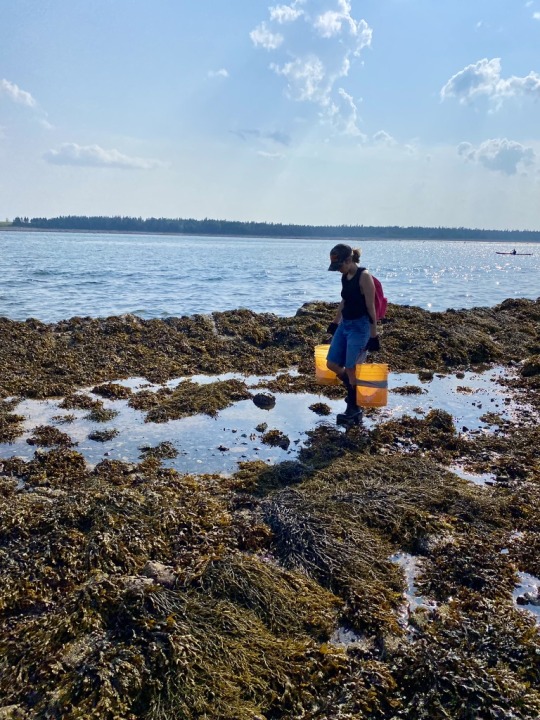
Hands-on learning in the field!
I enjoy getting to connect with people and since I have previous experience as a camp counsellor, I think my ideal role as a nature interpreter would be to run some sort of children's programming in local parks, bodies of water, or nature centres. I would be able to lead guided walks and prepare activities for the audience to do so that it is not just listening to me speak for however long. Potential examples of this would be planting seeds and growing our own plants in a community garden, using nature to create art (which is a very common camp craft), trying to identify bird calls, and completing nature scavengers hunts in the area. This would allow me to be the best interpreter that I can since I am playing to my strengths as a tactile and visual learner. I would however need some adaptability skills to cater to those that may prefer auditory learning. I would have to work on public speaking and making sure that all the information I am conveying is correct. My ideal role as an interpreter would be to help foster a love for nature in impressionable minds so that more and more kids grow up with an appreciation and interest for our surroundings.
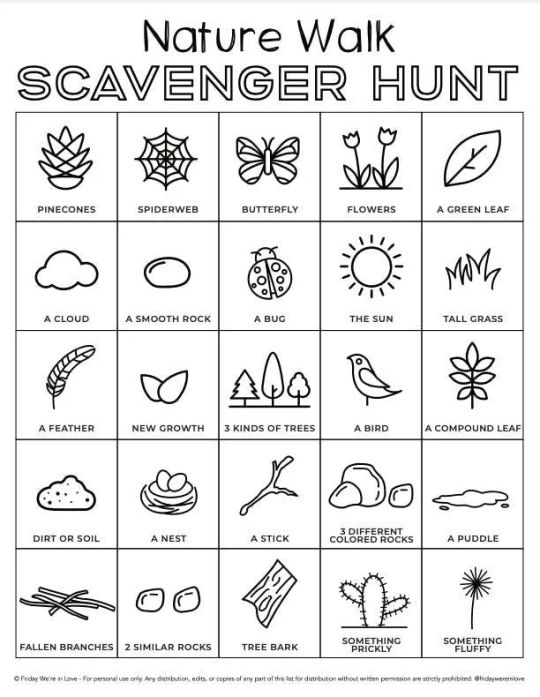
Example of a nature activity. Accessed on September 18, 2024 from https://fridaywereinlove.com/nature-scavenger-hunt/
Some additional skills that may be beneficial here would be creativity and organization. I would need to be able to come up with new and creative ideas that pertain to the environment and conditions we are in. Being able to think of fun activities to do in each season would be key as trying to identify flowers would not work very well in the winter. Additionally, being organized is always an important skill to have but I feel like it is even more necessary when outdoors. Depending on the location of the park we may be quite a while away from cars and buildings so I would need to have everything I needed for the program ready to go.
All in all I would be very happy being a nature interpreter anywhere that lets me be outdoors doing hands-on activities.
2 notes
·
View notes